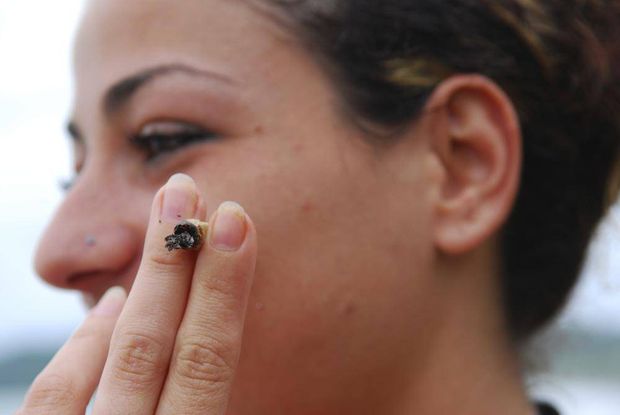![]()
Canada's largest daily newspaper
Top court, not PM, calls the tune
The Toronto Star, by Rosie DiManno, September 24, 2008
Prime Minister Stephen Harper can say what he wants and promise what he dares.
But when it comes to this country's laws, the Supreme Court of Canada decides what's constitutional and what's not.
This past May, the Supremes declared in a 5-4 decision that the Youth Criminal Justice Act is unconstitutional, in parts, as written: Those under age 18 cannot be sentenced as adults, nor identified, unless the Crown persuades a judge of the necessity for doing so.
The youth act, passed in 2003, contained a reverse-onus element. It had presumed that youths convicted of serious offences - murder, attempted murder, aggravated sexual assault - would be sentenced as adults, unless a judge could be persuaded otherwise by the defence.
Even where a Crown was unsuccessful in seeking an adult sentence, the names of the accused, once convicted of these serious crimes, could still be published unless a judge ruled to the contrary.
The Supreme Court, however narrowly, didn't like that. The presumption, that reverse onus, is now gone. Crowns have to make the case.
On the merits of that decision, it seems highly unlikely that Harper, if re-elected, can slap stiffer sentences - including life imprisonment - on 14-year-olds convicted of horrific crimes, as he vowed Monday.
Nor would names of minors found guilty of murder be routinely released, another hard-line proposal.
Any legislation passed in the House of Commons would no doubt still end up in Supreme Court, as D.B. versus Her Majesty the Queen did four months ago. That 17-year-old, who pleaded guilty to manslaughter in the death of a teenager he'd punched and knocked to the ground, sought and received a youth court sentence. The Crown appealed. Canada's top court upheld the trial judge's sentence.
Lifting the publication ban - an "enhanced severity'' - is also unconstitutional, the court ruled; the onus must be on the Crown prosecutor to justify identifying the youth.
In practice, this is what we get:
• Canada's youngest multiple murderer, 12 years old when she and her adult boyfriend committed the crimes, is convicted of killing both her parents and little brother.
The child had run into her arms for help. She stabbed him in the neck. Sentence: 10 years, the maximum available. With credit for time served, four years in custody, the rest under community supervision.
• Teenage sisters drown their alcoholic mother in the bathtub, planning to use the insurance money - it was originally ruled an accidental death - for drugs and cavorting. Sentenced as youths, convicted of first-degree murder: Six years in custody.
The law does not allow me to identify any of these killers.
So exacting is the legislation - the central principle of diminished blame for those under 18, always, and the mandatory protection of their identities - that naming the related victims is forbidden as well. The dead are denied even that. For the record, they are forever anonymous.
• Kevin Madden stabbed his kid brother - the 12-year-old who'd once idolized him - 71 times. A youth when he committed frenzied murder, Madden was only publicly named upon sentencing as an adult. The slain boy was known as "Johnathon" throughout trial. Just Johnathon. Madden's sentence: Life with no parole for a decade.
• Dmitri "Matti" Baranovski, 15, was kicked to death when he refused to be robbed of his cigarettes. Two 20-year-olds, youths when the crime occurred, were tried as adults, identified - Meir Mariani and Williams "Lee" Cochrane - and convicted of manslaughter. Sentences: Two years less a day, on top of the four years served pending trial.
These are all exceptional cases. But murder by youths is an exceptional crime.
Bang the law-and-order drum as loudly as he likes, Harper is in no position to change that.
Unless, of course, he changes the judges.


Teenage pot smoking may lower IQ - for life
The Globe and Mail, Zosia Bielski, Aug. 27 2012
Chronic use of marijuana before age of 18 can cause "lasting harm to a person's intelligence, attention and memory" - and quitting pot later in life doesn't reverse the damage, says daunting new research out of New Zealand.
The study, which followed 1,037 Kiwis for nearly 40 years, found that adolescents who smoked marijuana persistently for years showed declines of eight IQ points when their scores were tabulated at age 13 and then at 38. Teens who got stoned regularly all scored significantly worse than their sober counterparts on tests measuring memory, reasoning and processing speed, with family and friends of users corroborating the findings anecdotally.
"Marijuana is not harmless, particularly for adolescents," lead researcher Madeline Meier, a post-doctoral researcher at Duke University, said in a release. "Somebody who loses eight IQ points as an adolescent may be disadvantaged compared to their same-age peers for years to come."
